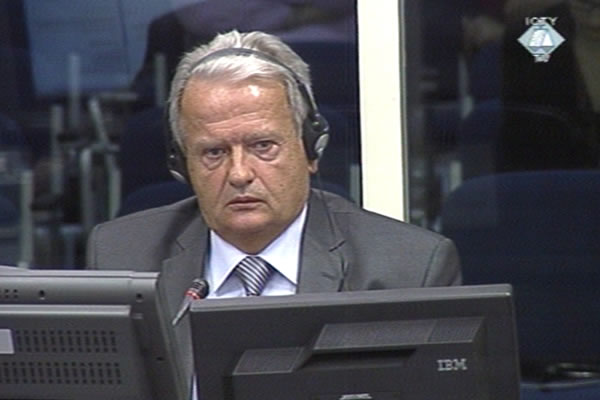Home
QUESTION WITHOUT ANSWER
Mladic’s former assistant for organization, mobilization and personnel issues Petar Skrbic didn’t want to answer the question if he thought the ‘evacuation’ of women and children from Srebrenica on 12 July 1995 was a crime. Skrbic provided buses for the evacuation
 Petar Skrbic, witness at the Ratko Mladic trial
Petar Skrbic, witness at the Ratko Mladic trial In his testimony at the trial of his former commander Ratko Mladic, retired VRS general Petar Skrbic used his right not to answer to any potentially incriminating questions. At the very end of his testimony, the prosecutor asked Skrbic if ‘it is a problem for you to accept the fact that you participated in the transfer of the non-Serb population of Srebrenica in July 1995 because you know it was a crime’. Mladic’s former assistant for organization, mobilization and personnel issues in the VRS Main Staff said that he would ‘rather not’ answer the question.
Prosecutor Peter McCloskey followed up on a series of questions asked by the judges about the ‘mobilization of 50 buses’ ordered by Skrbic on 12 July 1995, in line with an order issued by the Main Staff commander Ratko Mladic. The judges tried to check if Skrbic knew what the buses would be used for when he forwarded Mladic’s order to the RS Defense Ministry. Skrbic said he had been told that the buses, which were to be sent to Bratunac, would be used ‘for the evacuation’ but he stressed he hadn’t known at the time what kind of evacuation it would be. As alleged in the indictment, on 12 July 1995, the day after the fall of Srebrenica, the evacuation of refugees who had gathered in Potocari began.
When the judges asked how he could order the mobilization of the buses if he ‘didn’t know what they would be used for, where they should go and who would issue the instructions’, Skrbic replied that it was not his job to figure it out. All he needed to know was the destination, the football stadium in Bratunac, and the purpose, ‘evacuation’. Though he obviously failed to convince the judges that his answers were valid, the judges didn’t force Skrbic to answer to the prosecutor whether the knowledge that it was a crime prevents him from accepting that he too played a role in the forcible transfer of the non-Serb population from Srebrenica.
In the cross-examination, the defense tried to draw the attention of the Trial Chamber on the responsibility of other Bosnian Serb military and political officials. Skrbic confirmed that Mladic was not on good terms with the supreme commander of the RS armed forces Radovan Karadzic. On several occasions Karadzic tried to have Mladic removed from his post. Karadzic would sometimes ‘bypass’ Mladic, issuing orders directly to corps commanders, as he did with General Radislav Krstic, when he personally authorized Krstic to launch the operation in Srebrenica.
As the defense counsel’s questions indicated, General Manojlo Milovanovic may bear some of the responsibility. He was the chief of the Main Staff at the time and was in the Western front in Krajina during the operation in Srebrenica. Skrbic contends that ‘nobody ever represented’ Milovanovic, contradicting the prosecution’s allegation that during the Srebrenica operation General Radivoje Miletic represented Milovanovic.
Miletic’s case is in the appellate stage. The Trial Chamber sentenced Miletic to 19 years.
Ratko Mladic’s trial continues tomorrow with the evidence a new prosecution witness.Linked Reports
- Case : Mladic
- 2013-07-05 CLEAN-UP OPERATION AFTER FALL OF SREBRENICA
- 2013-07-04 FOOTBALL WITH ‘CHETNIKS’
- 2013-07-03 DEFENSE CONTESTS ERDEMOVIC’S CLAIMS USING ACCOMPLICES' STATEMENTS
- 2013-07-09 NEW FIGURES FOR SREBRENICA VICTIMS
- 2013-07-10 AUSTRALIAN POLICE OFFICER IN SREBRENICA’S KILLING FIELDS
- 2013-07-15 EVIDENCE FROM MASS GRAVES
